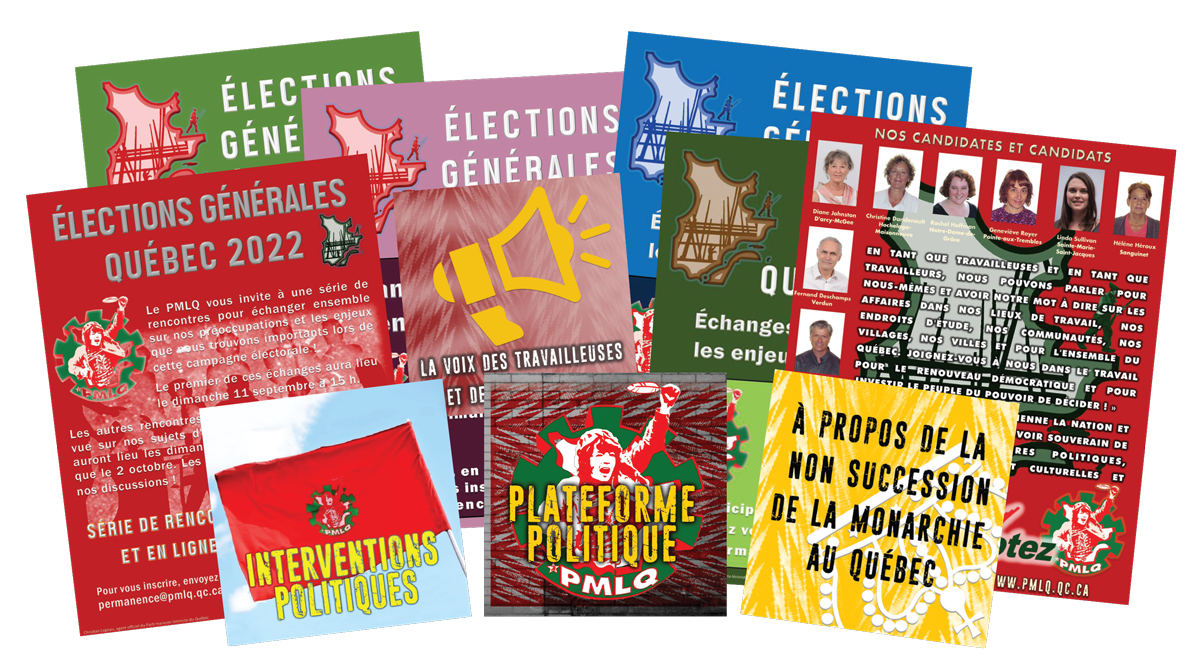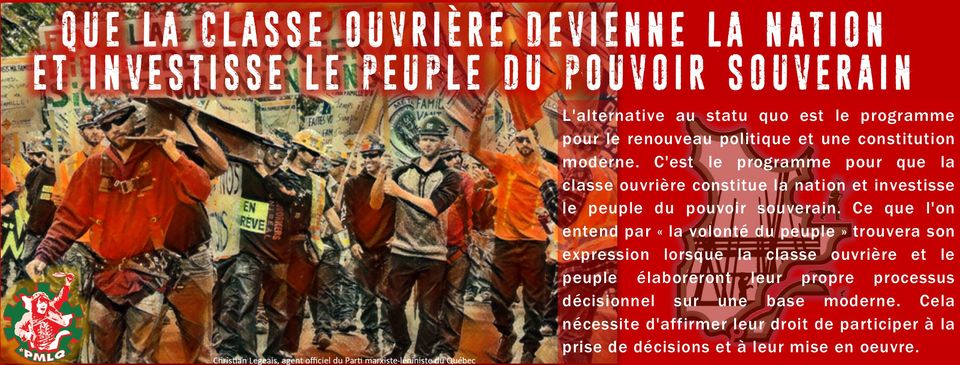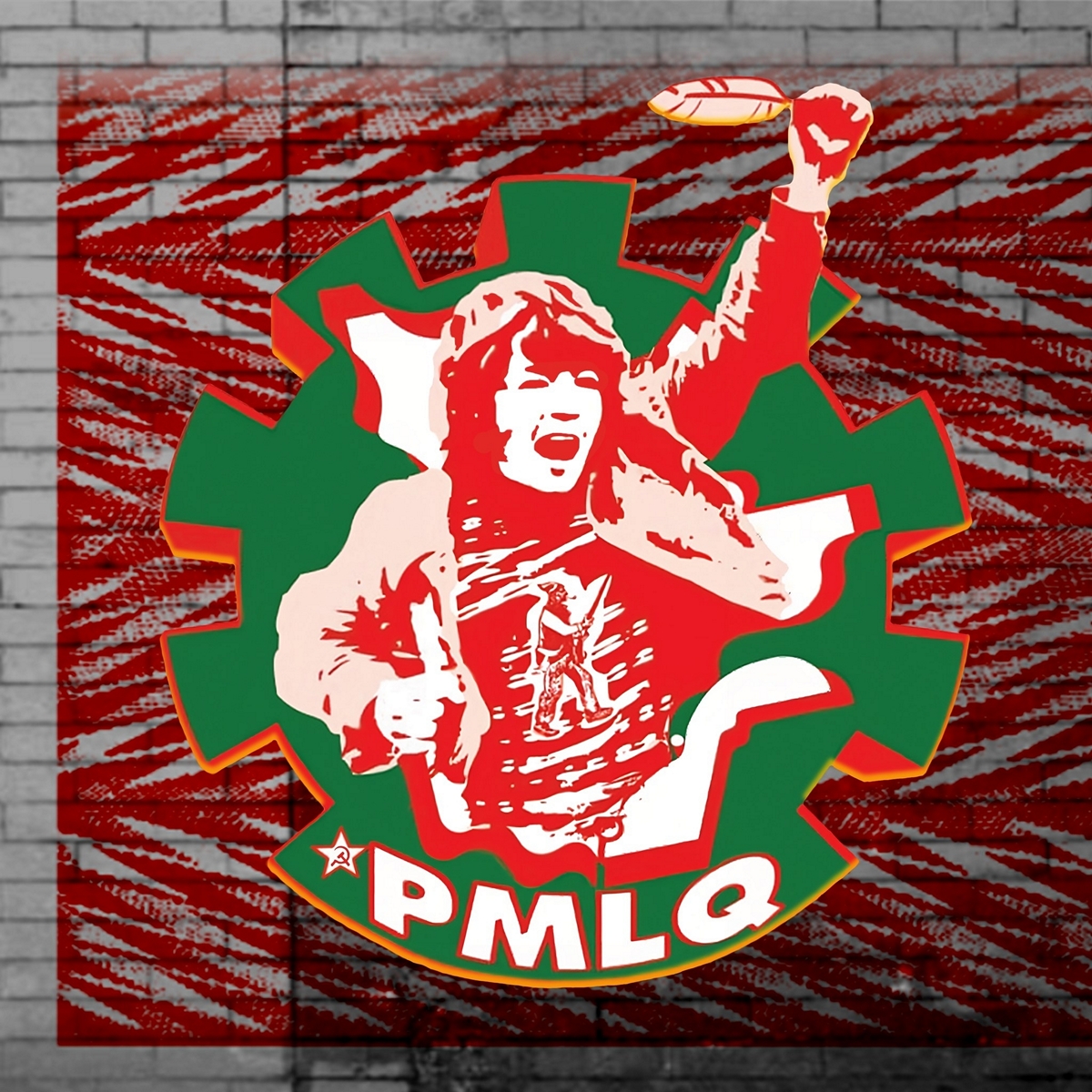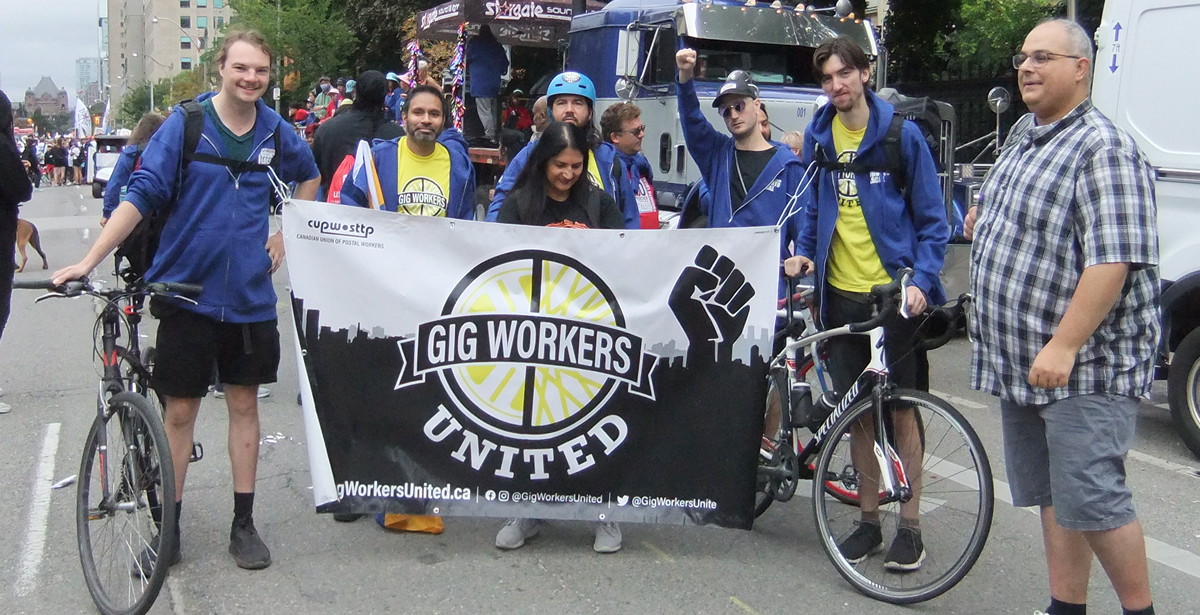October 5, 2022 - No. 26
Discussion on Quebec Election Results
Post-Election Statement of the PMLQ

• How the National Assembly Works
Matters of Concern to Canadian Workers
• Workers Confront the Fraud of Labour Law
Discussion on Quebec Election Results
Post-Election Statement of the PMLQ

The PMLQ congratulates its candidates and supporters for participating in the October 3 Quebec election by providing forums through which the voice of the workers and people themselves could be heard.
The PMLQ also congratulates Québec Solidaire, its leaders, candidates and supporters for holding their own in the October 3 election and PQ leader Paul St-Pierre Plamondon for winning in his riding against all odds. It congratulates the electors who, when they saw their vote could make a difference, cast it in their favour.
 The
PMLQ calls on the deputies of both parties to take firm stands in the
National Assembly in consultation with the working people and youth to
oppose the CAQ's concentration of police powers in the executive. It
will use the executive to push schemes to pay the rich for new
technologies and
infrastructure for the communications, transportation, energy and
security corridors which further integrate Canada's resources,
including critical minerals, to the U.S. war economy. It will further
destroy the public sector by privatizing the delivery of health care,
education and seniors' care in
the name of efficiency and renovation. It will not pay attention to the
needs of the ever-growing number of Quebeckers without housing, lacking
food and resources. On the contrary, in the name of helping the poor,
it can be expected to use the deepening economic crisis to hand over
pittances while
people are left to fend for themselves. It will continue to neglect and
criminalize Indigenous peoples and dispossess them through the
privatization of their resources and continue state-organized racist
attacks against them as well as against immigrants, refugees and those
whose values, beliefs and
traditions it considers alien to the so-called Quebec way of life.
The
PMLQ calls on the deputies of both parties to take firm stands in the
National Assembly in consultation with the working people and youth to
oppose the CAQ's concentration of police powers in the executive. It
will use the executive to push schemes to pay the rich for new
technologies and
infrastructure for the communications, transportation, energy and
security corridors which further integrate Canada's resources,
including critical minerals, to the U.S. war economy. It will further
destroy the public sector by privatizing the delivery of health care,
education and seniors' care in
the name of efficiency and renovation. It will not pay attention to the
needs of the ever-growing number of Quebeckers without housing, lacking
food and resources. On the contrary, in the name of helping the poor,
it can be expected to use the deepening economic crisis to hand over
pittances while
people are left to fend for themselves. It will continue to neglect and
criminalize Indigenous peoples and dispossess them through the
privatization of their resources and continue state-organized racist
attacks against them as well as against immigrants, refugees and those
whose values, beliefs and
traditions it considers alien to the so-called Quebec way of life.
Quebeckers will count on QS to use its voice and resources to champion the solutions the working people propose on all the matters which concern their living and working conditions as well as highlight their concerns on the environment, in Rouyn Noranda and all of Quebec.
The PMLQ strongly encourages QS and the PQ to champion enlightened positions and in no way, shape or form conciliate with the anti-worker arrangements the CAQ is enacting or with its pretense to represent Quebec nationalism or values in the name of defending the French language, integration and secularism. Its policies are chauvinist, divisive positions which do none of the above.
The PMLQ calls on the QS and PQ to use their voice and resources to oppose Legault's anti-immigrant racist outlook and policies. It also calls on them to follow through with demands for renovating the electoral process and constitutional order so that the sovereign decision-making power is vested in the people. The times are calling on them to not conciliate on the principle of uniting the Quebec people in action in defence of the rights of all and Mother Earth. The times require them to adopt positions based on principles and modern definitions of rights by virtue of being human. Arrangements are needed which put human beings at the centre of the solutions they themselves provide. This is how to open society's path to progress.
The PMLQ will continue to grow the reach of its human resources and media to provide forums in which the working people and youth can discuss their concerns and exchange views which permit them to find their bearings so as to intervene in the situation in a manner which favours their interests. It will contribute to Workers' Forum and use other means to provide information on the living and working conditions of the people and the concerns of the youth. It will pay specific attention to the urgent need to renounce the current constitutional order and elect a Constituent Assembly which creates a structure where all citizens are equal and can vest sovereignty in the people on a modern basis. It will also raise awareness on the need to make Quebec a zone for peace and to support those who are fighting in defence of the rights of all.
How the National Assembly Works
We are providing information on the workings of the National Assembly to assist people in discussing the results of the Quebec election of October 3. As predicted, the Coalition Avenir Québec (CAQ) won a majority of seats that it will use to govern by decree against the interests of workers, the regions and the well-being of the social and natural environment.
In the election only the Liberal Party of Quebec (PLQ) met the threshold for recognition as a parliamentary group. It is not yet known whether Québec Solidaire, which elected 11 MNAs and won 15.42 percent of the vote, will be granted official status by the CAQ.
According to the explanation given by Encyclopedia of Quebec Parliamentarism (National Assembly of Quebec, August 28, 2013):
Any group of at least twelve MNAs elected under the banner of the same political party or any group of MNAs elected under the banner of a political party that obtained at least 20 per cent of the votes in the most recent general election constitutes what is called a parliamentary group.
With the exception of the Speaker of the National Assembly, who is not a member of any parliamentary group, MNAs who do not belong to a group sit as independents. The last independent candidates to be elected were in the general election of June 5, 1966. Since then, all candidates elected in Québec have been elected under the banner of a party.
Distinction Between Parliamentary Groups and Political Parties
The notion of parliamentary group was introduced in the rules of procedure during the 1984 parliamentary reform. It replaced the notion of "recognized party" found in the former rules in force from 1972 to 1984.
Today, the notion of party, although extremely important in the Québec electoral system, is almost completely evacuated in the context of the parliamentary process. Not all parties that have elected candidates can claim the title of parliamentary group. Only a party that has successfully qualified under the rules of parliamentary procedure will be considered to constitute a parliamentary group. MNAs who have not been elected under the banner of such a party may, once they arrive in the Assembly, join a recognized parliamentary group or sit as independent MNAs."
Rights Conferred on Parliamentary Groups
As a leader or member of a parliamentary group, an MNA enjoys certain benefits on certain occasions.
The leaders of parliamentary groups are given more time to debate motions of substance and form, the opening speech, the budget speech and ministerial statements. Special speaking rights are also given to the representative of each parliamentary group during certain very short debates provided for in the Standing Orders. Finally, during restricted debates, the President, following a meeting with the leaders, allocates speaking time among the parliamentary groups, taking into account the presence of independent Members.
The notion of parliamentary group is also an important criterion that the President must take into account in allocating certain instruments of parliamentary control available to opposition Members, such as the business registered by opposition Members, the choice of a subject for interpellation, the allocation of motions of censure and the order of debates at the end of the sitting.
The President must also take into consideration the notion of parliamentary group when allocating questions for oral question and answer period. When the official opposition is the only opposition group, this period is almost entirely devoted to its questions. If there are several opposition groups, the Speaker allocates questions according to their respective numerical importance, while recognizing the leading role of the Official Opposition and taking into account the presence of independent Members.
Other advantages enjoyed by parliamentary groups relate to the composition and chairmanship of parliamentary committees. Finally, importance is given to the notion of parliamentary group for the composition of the Bureau of the National Assembly and the allocation of budgets for research and support purposes.
Precedents: Presence of More than Two Parliamentary Groups
Since the 1984 parliamentary reform, three legislatures, two of which were led by a minority government, have had more than two parliamentary groups.
First, in the 38th Parliament, the Quebec Liberal Party, with 48 MNAs elected under its banner, constituted the parliamentary group forming the government. The Action démocratique du Québec (ADQ), with 41 elected members, became the official opposition, while the Parti québécois, with 36 elected members, formed the second opposition group.
At the beginning of the 39th Parliament, the Action démocratique du Québec had elected seven MNAs and received less than 20 per cent of the votes cast in the last general election, so the six MNAs elected under that banner following the departure of their leader could not meet the conditions for forming a parliamentary group.
On April 21, 2009, at the end of a lengthy parliamentary reform exercise, the MNAs from the ADQ were recognized as a parliamentary group according to the conditions defined in a document tabled and adopted by the Assembly on the same day. Under this document, which was in effect for the duration of the legislature, a parliamentary group was any group of MNAs from a political party that, in the last general election, had won at least five MNAs and 11 per cent of the vote. The ADQ retained this status despite the decision of two of its members to sit as independents.
However, following the merger of the ADQ with a newly formed party, the Coalition avenir Québec (CAQ), the four members of the second opposition group, as well as five independent MNAs, notified the Speaker that they now intended to sit as independents under the CAQ banner. In a decision rendered on February 14, 2012, Speaker Jacques Chagnon, after finding that the document recognizing the ADQ as a parliamentary group had lapsed, refused to recognize the status of parliamentary group for the nine members of the CAQ.
In the 40th Parliament (2012-2014) the Parti Québécois, having elected 54 MNAs in the general election, became the parliamentary group forming the government, while the Liberal Party of Quebec, with 50 elected MNAs, became the official opposition and the CAQ, with 19 MNAs, the second opposition group. In addition, the National Assembly had two independent MNAs from Québec Solidaire.
Sources:
Bonsaint, Michel (ed.). La procédure parlementaire du Québec, 3rd ed, Québec, National Assembly, 2012, p. 173-195.
Matters of Concern to Canadian Workers
Workers Confront the Fraud of Labour Law

Toronto Labour Day 2022
The fraud of labour law in Canada is being exposed in practice with the resistance of workers to the continuing attacks against their rights and just claims on the value they produce. Workers are told they do not have the right to decide their own organizational affairs and dealings with their employers. Throughout the country the state uses its own concocted labour law and legislation to attack workers' right to have their own independent organizations, thinking and agenda. This is particularly evident and exposed with irregular and contract workers.
The current efforts to organize workers in the transportation sector expose labour law as an impediment to organizing and waging a successful campaign for wages, benefits and working conditions suitable to the workers themselves. In the struggle with U.S. companies such as Amazon and Uber, workers even have to fight the irrational view that they are not workers.
Instead of starting from their own reference point as workers with rights, demands, claims and for working conditions suitable to themselves, they are forced to justify a legal position as employed workers within the legal definition of existing legislation and labour law. The incoherence of the situation underscores the reality that the imperialist class in power has created labour laws and codes to serve the most powerful employers and their private interests in opposition to the rights and claims of the working class and the broad interests of society.
Labour Law in Ontario
Labour law in Ontario is obstructing the Uber Black (Limousine) Drivers from fighting for their rights. Uber reached an informal agreement with a union to prohibit its limousine drivers from pursuing their efforts to form their own union of Uber employees. Uber then used the agreement to block another organization called Gig Workers United, supported by CUPW, from establishing a broad union of Uber drivers and fighting for their demands.
In response to Uber's informal agreement with the other union, CUPW has put a complaint before the Ontario Labour Relations Board which raises three main questions: (1) is Uber an employer of Uber drivers; (2) did the secretly negotiated deal with the other union amount to interference with the formation and selection of a union by Uber drivers given that both the other union and CUPW were actively organizing drivers at the time the other union was given special access to the drivers; and (3) does the deal amount to Uber providing the other union with financial or other support contrary to section 70 of Ontario labour law?
It can be seen in this case that the issues being discussed obscure the fight for Uber workers' rights, claims and demands in their relations as workers who sell their capacity to work to their employer. In this case, labour law forces workers first to defend themselves against the absurd notion that they are not employees of Uber. This preoccupation supplants the important work of building public opinion amongst themselves and others regarding the necessity to organize to defend their just claims and demands as employees of Uber and how this fight should proceed. Labour law hinders Uber workers from organizing on their own behalf independently of the state and company. Labour law splits the workers as to which union they support and also sets an agenda as to what should and can be decided and what methods are used.
Labour law acts in similar ways to the outmoded liberal democratic institutions of party governance where the governing party and official opposition and media set the agenda during elections and the various cartel parties split the people into opposing factions instead of uniting them to solve problems and develop their relations amongst themselves and with nature.
Alberta Labour Law
Over forty per cent of the 160 "sub-contracted" Amazon drivers in Leduc Alberta signed cards to join a union and put their bid to the Alberta Labour Relations Board (ALRB) as per labour law. Their application did not even reach the level of a formal hearing as the ALRB dismissed it out of hand "due to lack of evidence they work for Amazon," according to union organizers.
Teamsters' organizer Stacy Tulp says, "I made the application (to the ALRB) as Amazon employees of Amazon Canada. They kicked it out and said you have no evidence that they are Amazon employees."
Tulp says every signed card was from a driver who Amazon says is not employed by it but rather is employed by a third party Amazon subcontractor called a Delivery Service Partner (DSP).
"The drivers are all under a third party subcontractor. Amazon supplies everything. Amazon supplies the vans, Amazon even supplies vests. Their only employer is Amazon. So their subcontractor is more of a payroll administrator," Tulp explains.
A DSP is similar to an accounting department within a company in charge of revenue and payroll. Amazon DS Partners act as regional third party subcontractors and appear on paper as a driver's employer on behalf of Amazon. Amazon drivers attempting to organize into unions across North America have had their efforts blocked with this deceptive practice. According to Amazon, each DSP can employ 40-100 people and be started with as little as $15,000. Multiple teams of DSP drivers work out of a single Amazon warehouse.
Tulp says this deception obscures the issues the drivers want settled including high quotas and heavy workloads. He explains: "Let's say you have to deliver these 160 packages in a 10 hour timeline. You don't deliver those packages in that timeline, you are disciplined by your subcontractor and the subcontractor is disciplined by Amazon. But if you were able to do about 160 packages, next week, you get 180 packages."
Through their own efforts and struggles to organize and defend their rights, claims and demands for working conditions suitable to themselves, workers are exposing the fraud of labour law as a state dictate of the most powerful employers serving their narrow private interests.
The working class is developing its own independent practice and thinking as to how to defend itself under the current conditions and in doing so open a path to its emancipation from the outmoded system of workers selling their capacity to work to an imperialist/employer class of exploiters. Workers and youth who uphold the rights of all should answer the call of history and take up the work to organize and advocate for the working class independently of the imperialist/employer state and its agenda and reference point.
(To access articles individually click on the black headline.)
Website: www.cpcml.ca Email: editor@cpcml.ca

